
John Dolan and Ayub Khan have long shared an interest in the international library scene and how different countries and cultures can share and benefit from each other. In this article they share their experience of working internationally and the lessons they learned.
THE British Council is an outward-looking organisation, which exists to ‘create friendly knowledge and understanding between the people of the UK and other countries’. It is essentially about promoting British culture, institutions and
values abroad in a user-friendly, supportive and constructive way. As such, its work is perhaps better known elsewhere than at home.There is heavy emphasis on learning opportunities, and there is also a strong focus on the UK’s creative
industries and sharing their knowledge, expertise and innovation with global audiences.
Our involvement started when we answered a British Council advertisement, in October 2014, for help with reinstating libraries in Lahore
and Karachi, Pakistan. The Council had closed more than 200 of its libraries 15 years previously but was planning to reopen and reinvent some of these much-missed institutions. Our early success in Pakistan led to invitations to submit
proposals for further British Council projects. Working with the British Council we felt part of a big movement, not just to promote Britain but to influence influencers, enable prosperity and promote good relations between the UK
and other countries. Moreover, in developing countries libraries are, gratifyingly, seen as offering solutions to today’s economic, cultural and social challenges.
The digital world
Everywhere we went we stressed the crucial value of digital provision, access and communications. It is a common western stereotype that in developing countries, especially in South Asia, there is widespread ownership of digital devices.
This is true but with caveats:
- it is nowhere near 100 per cent
- not everyone has access to the internet
- there remain limitations on digital and information literacy.
That said, the trajectory is towards increasing ownership, better broadband and Wi-Fi. To reach remote communities and all generations, the British Council must help the delivery of digital information, learning and communications. Moreover,
it must incorporate digital creativity into its programmes. Such thinking had to become central to the library mission.
This was not easy in countries where public libraries had a poor image, had no catalogue, no library management system, no Wi-Fi and no web presence of any significance. Even so, they were busy providing study space for students with nowhere
else to work. There is also an innovative proposal for a single virtual library presence for the whole of south Asia, with a strategy that is now being rolled out across the region.
Case Studies
Pakistan - We visited Lahore to advise on building design, vision and policy statements, strategic planning, collections policy, marketing and audience plans, and a membership scheme. In Karachi, where we worked with newly-appointed
staff, the soon-to-be-opened library was hosting fashion workshops, bringing together established British and aspiring Pakistani designers. The internationally-renowned Maheen Khan, whom we dubbed “the Vivienne Westwood of Pakistan”,
also took part.The British contingent continued to mentor their Pakistani counterparts for six months following the visit. This is a good example of how the British Council exercises ‘soft power’ and influence abroad.
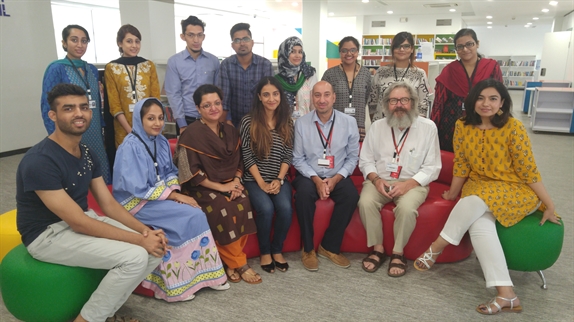
Promotional pop-up libraries preceded the opening of the Karachi Library. In a shopping mall, for example, curious shoppers and young families experienced ‘library walls’ – devised initially by Artefacto - for the first time. Life-sized
images of bookcases offered a selection of copyright-free titles, each bearing a QR code linked to online collections.This rapid, free and previously unseen access to literature was a source of amazement. It would also mean that shelf
stock in the new libraries could be weighted towards contemporary writing, with much traditional literature being delivered electronically.
The new libraries in Karachi and Lahore are now well-established and successful. They are places of excellent design, with a modern and relevant stock, amazing events programmes and a vibrant web and social media presence (@pkBritish).
This was assured by recruiting teams of educated, articulate and creative young people from diverse backgrounds – only one of whom had any previous library experience.
Detour to Columbo, Sri Lanka Detour to Within weeks of starting the Pakistan project we were asked to present our work to a regional meeting of British Council Country Directors and senior managers in Colombo, Sri Lanka. As relative
newcomers we were daunted by the prospect of addressing such a senior and experienced audience whose responsibilities spanned nations. However, our strategy was well-received and the work continued.
Zimbabwe In Zimbabwe the British Council libraries in Harare and Bulawayo had survived the cull of previous decades but now needed attention. Bulawayo had a modern library, albeit the sixth floor of an office block, while the Harare
library, in a more historic setting, had declined, with old furniture, little equipment and poor stock. Each had a keen professional librarian but few staff, relying on student volunteers to cover the day-to-day service.
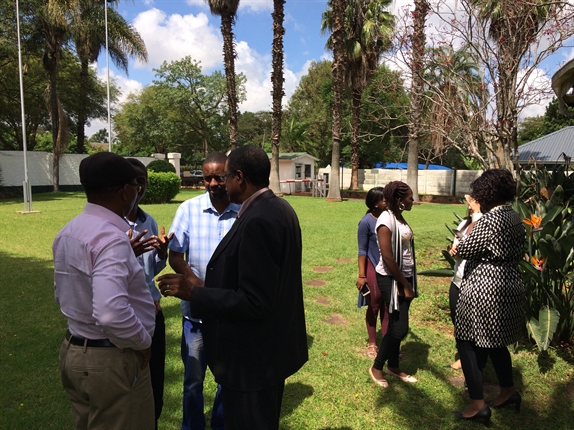
We hosted workshops for users, former members and non-users to determine needs and expectations. The response was very positive and participants were keen to partner with us. With less funding available than in South Asia, we proposed
a strategy of medium-term staggered change programmes, design options, collection policies, and options for ICT.
The Harare librarian, Maynard Chipangura, visited the UK, following a tour itinerary we prepared which included attendance at the CILIP Conference in 2017. The Harare library has been modernised, there are new e-resources and the library
has become busier. Everyone has benefitted.
India – India’s passion for literature is matched by pride in S. R. Ranganathan, the father of modern librarianship. A Government review of library provision led to the establishment of the India Public Library Movement (IPLM).
At state level, under the steer of this body, a plan for library modernisation was initiated.
Working remotely, we prepared a strategy for West Bengal. Part of this exercise examined international trends in libraries - something John had undertaken previously for colleagues in Ireland, where policies and aims were very similar:
Libraries should be user and community-oriented, contribute to economic growth, support education, and give access to interactive and group learning and innovation in creative spaces with physical resources, and accelerate the shift
to digital resources both downloadable and interactive. The makerspace movement was taking off and a small number of libraries grasped this opportunity. We were patient and mindful of a penchant for reports and ongoing dialogue
that might slow down change on the ground.
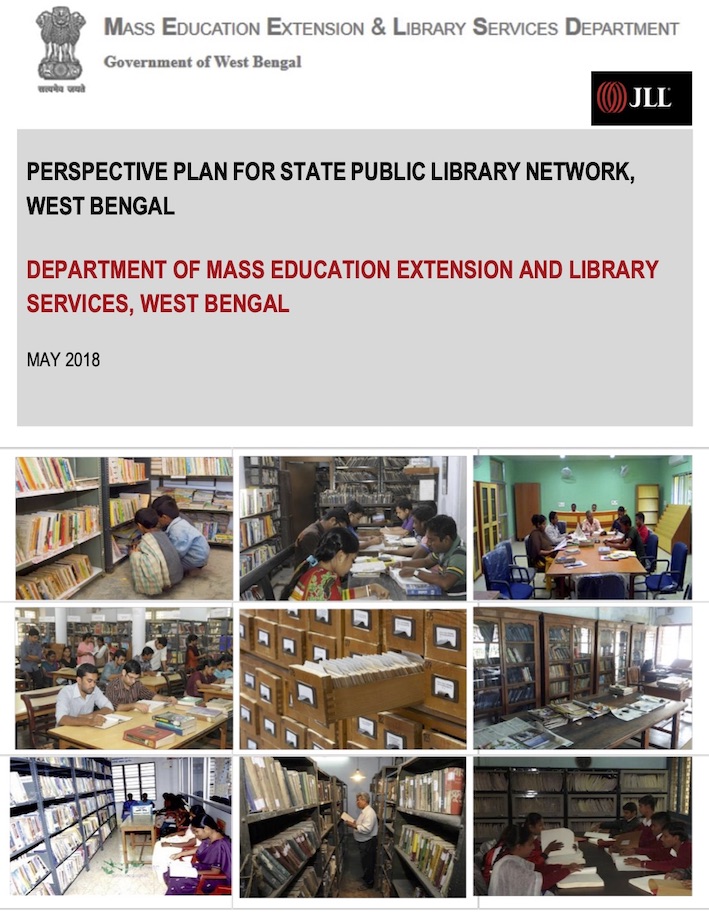
One of the larger global consultancies (JLL) took up the background research on West Bengal libraries (number, stock, staffing, usage) and set our strategic outline and recommendations within a bigger report of 2019.
Ireland Ireland was seriously impacted by the 2008 financial crisis and in 2012 chose to review public library provision in the face of substantial economic and social challenges. The Government had invested considerably, through
the former Library Council of Ireland, in new and refurbished libraries and online services. However, further investment was now uncertain.
John was invited to work with the Local Government Management Agency on a plan for the future of the service. This involved an extensive nationwide consultation programme with focus groups across the country representing priority interest
groups. This programme was designed and coordinated at the LGMA but run by local managers. Every staff member was invited to contribute observations and ideas- and many did so. All made a substantial contribution. John also undertook
a review of library developments worldwide to ensure the latest thinking, innovations and exemplars would inform the plan.
A five-year action plan was published in 2013 Opportunities for all: The pub lic library as a catalyst for economic, social and cultural development 2013-2017 .
This launched a Government-led, locally-driven modernisation programme, its success acknowledged in the second plan in 2017: Our Public Libraries 2017-2022.
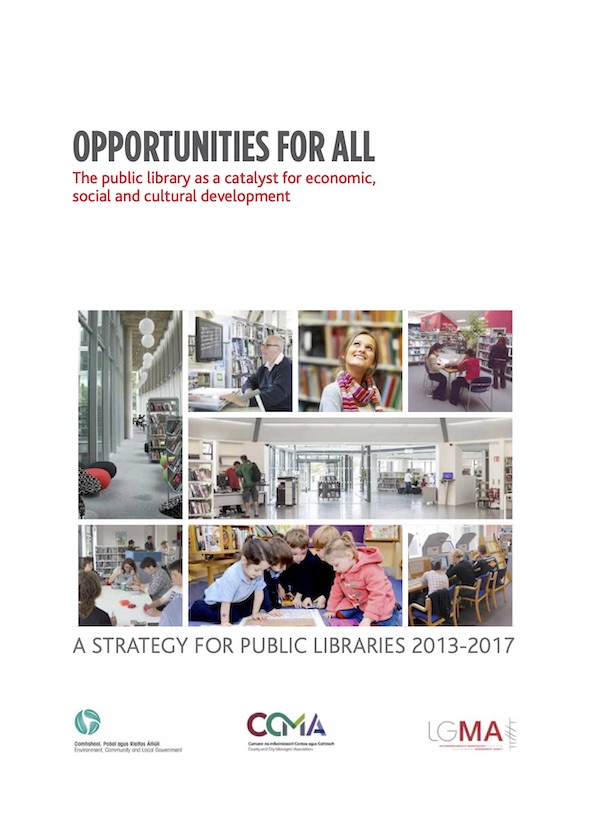
"While Opportunities for All, the public library strategy for 2013 to 2017, was delivered in socially and economically challenging times, it delivered some very significant innovations for the service, including a national library catalogue supported by a national delivery system. Public libraries continue to deliver a local service and I believe this is critical to the long-term sustainability of the library service - but it is now a local service with a national reach.”
Michael Ring T.D. Minister for Rural and Community Development.
Ireland’s five-year plans are a striking example of strategic vision and leadership delivering local services with success.
Dubai In 2019, following a previous internal benchmarking exercise in Abu Dhabi, Ayub was part of a team from Red Quadrant, and led a research project to support library development in Dubai. The benchmarking looked at exemplar
libraries around the world - in the US, Denmark, Singapore, Saudi Arabia, Germany, France, Finland and UK. As part of the research, their directors were asked to identify key factors for developing successful libraries.Two common,
globally-relevant priorities emerged:
- building a genuinely motivated and integrated team - a multi-disciplined, digitally-skilled workforce who were customer-focused and determinedly front-facing
- finding a real-world problem to solve - identifying what the community and customers really want and need, and then working out how to fulfil their requirements
This, of course, should be an ongoing process. Successful libraries continuously adapt to changing tastes, priorities and opportunities. Other lessons learned from the research included:
- the customer experience is vitally important to success
- digital and physical offers should blend seamlessly, linked by interactive screens
- ‘reference library’ traditions should be updated to allow today’s researchers wide and easy access to resources
- collections should be curated, conserved, promoted - and exploited to increase library usage
- consulting communities and co-production promotes a sense of ownership
- practicalities are important - toilets, cafés, somewhere to park the pushchair or buggy and the car - and all-round accessibility
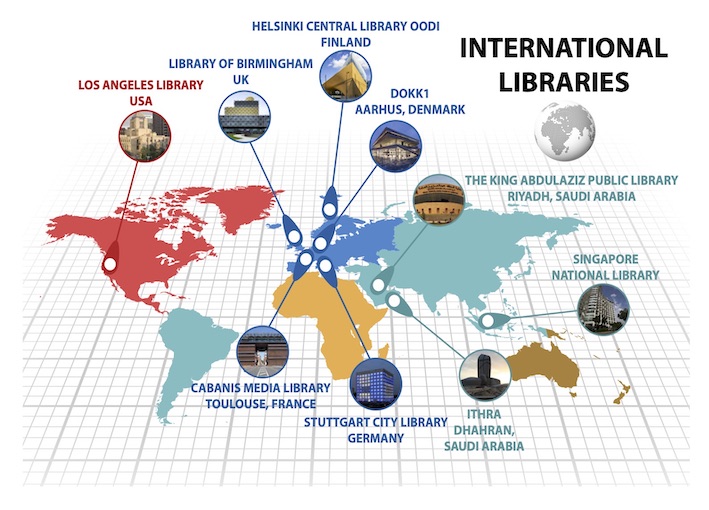
Recommendations were made for taking the learning forward - which now form part of an ambitious, ongoing programme of library development in Dubai.
Bangladesh – We have supported the
Libraries Unlimited programme in Bangladesh, which aims to modernise around 70 public libraries managed directly from the Ministry of Culture Affairs. The five-year project is jointly
funded by the Government of Bangladesh and the Bill and Melinda Gates Foundation. It was the last of the latter’s
Global Libraries programme of public library development and is led and overseen by the British Council, working with the Ministry of Cultural Affairs.

The physical remodeling of library premises has been slow but the installation of ICT with Wi-Fi, a new LMS, multiple nationwide activity programmes and community engagement, have all thrived. Libraries Unlimited has achieved recognition
at the highest level, with a National Library Day (5 February) now in its second year, a Prime Ministerial statement of support in Parliament, and street rallies and celebrations across Bangladesh.
Iraq – In 2019 we discovered that our work with the British Council had been shared with The Friends of Basrah Museum (FOBM) - who invited us to submit a proposal to help establish a research library in the new museum for archaeologists,
historians and other academics.
FOBM had been working with the Department of Antiquities to create a museum in a former palace of Saddam Hussein overlooking the Shatt al-Arab river. The project was part-funded by the DCMS Cultural Protection Fund. We attended the opening
of the stunning museum and found not only vacant rooms awaiting a library, but also a Learning Room . This gave us an interesting opportunity to comment on wider learning in the museum.

A strategy was developed following a workshop with stakeholders and discussions with the FOBM. The driving force behind the project was Qahtan Al Abeed (interviewed here).
Many core principles of a public library were relevant. Beyond that, we were grateful to the Cadbury Research Library at the University of Birmingham for transferable examples of collection management, storage, security, user relations
and public relations in managing a first class research library.
Research remained the central focus but programmes using the Learning Room, would also engage local communities, schools and nurture “young archaeologists”. This is a professional, imaginative and heart-warming
investment in the future of a country and a region that still suffers from unrest and uncertainty.
The value of partnership was tangible here. Early on we visited the Shoman Library in Oman, Jordan which offered a useful model. When, towards
the end of 2019, it was too difficult to host training in Basrah, everyone decanted to Oman where Shoman Library colleagues presented an excellent week of training in ICT. This was also a chance to mingle and bond with each other,
and British colleagues, in a safe environment - a unique example of team building. Further ongoing support is now being offered by the University of Kerbala, showing how more creates more.
UK Study Tours
Despite the cuts of austerity years, UK libraries are still held in high esteem around the world and there is a global appetite for learning how we do things here – and what we are planning next.
We organised several week-long study tours of the UK for colleagues from Pakistan, Bangladesh, India, Sri Lanka, Myanmar and Zimbabwe. Participants varied from the Minister of Cultural Affairs in Pakistan, senior officials from different
related ministries, librarians, staff and volunteers. Each study tour was different – built around aims that reflected the aspirations of the project owners. Essentially, we showed each tour group a combination of relevant and transferable
good practice from topics such as:
- Priority audiences
- Outreach and community engagement
- Strategic planning and change management
- Marketing and communications
- Cross sector collaboration
- Staff learning and development
- Customer service and experience
- Stock policy
- The physical environment
- Digital technologies
- Sustainability
Being Midlands-based we consistently featured Birmingham and Warwickshire on the itinerary. Visits included the Library of Birmingham and community libraries serving the city’s diverse communities. Intimate and inclusive engagement with
the local community was a common prerequisite. In Warwickshire we shared the experience of good design, extensive online resources and services, imaginative programmes and new makerspaces.
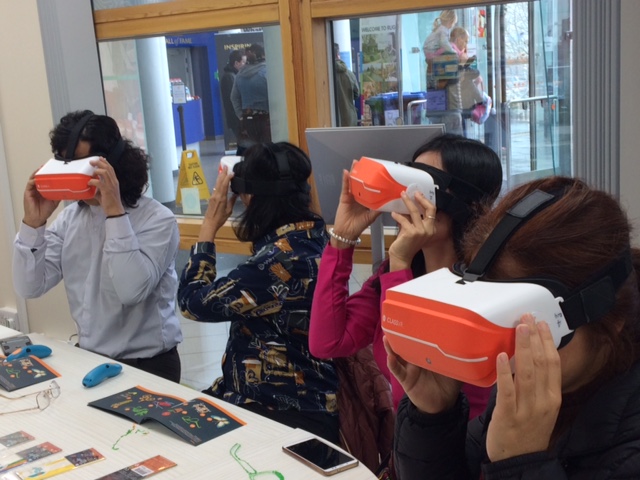
We also took our visitors further afield to see public libraries in London, the South East, the North West and Scotland. Other exemplar libraries visited included the Wellcome Collection, Manchester’s refurbished Central Library, the John
Rylands Library, the Portico Library and Chester Storyhouse. Demonstrations of library management systems, taken for granted in the west, were often a must. We included community-managed libraries in Warwickshire to showcase the county’s
successful devolution model. The familiar caveats were openly rehearsed – rural settings, prosperous communities, retired and willing people, ongoing library authority support – but the volunteer is a golden resource in developing
countries.
Most importantly, consistency in policy and strategy and clear-sighted leadership stood out as essential, while highly skilled staff, who were obviously adept and motivated by clear policy and direction, were central
to success.
The British Library featured in every tour and we were all grateful for generous presentations about digitisation programmes and the Business and IP services networked to other libraries. Other valuable contributions,
especially for strategic managers, included round table discussions involving colleagues from national agencies such as Libraries Connected, CILIP, the DCMS and Libraries Taskforce.
Learning, emerging themes andsuccess factors
One of the lessons for aspiring consultants is that you are part of a project for only part of the time and are rarely involved from beginning to end. You contribute but do not ‘own’ the project. However, if all goes well you will be generously
acknowledged and will gain new – and useful – colleague-friends.
The pace of progression varies, with shifts and variations according to local or changing circumstances. However, some common themes emerged:
Community, Audiences and Markets We stressed the centrality of creating a place and a service on an informed understanding of the likely and desired audiences and the active engagement of communities in plans and programmes.
Leadership A good project will reflect the parent body’s fundamental policies. Strategic direction will not necessarily determine detail but it will envisage outcomes and impact, inform a plan and support its delivery.
Partnership The library could be positioned at several points along a spectrum from complementary provision through constructive friendship to joint working. Early co-operation allows for sharing experience, benchmarking and target-setting.
Ideas and innovations General awareness of digital technologies was widespread and sometimes very informed but professional skill was limited. In some instances there was limited awareness of the power of library-specific technologies.
Staff In most settings training opportunities were extremely limited by lack of funds, a traditionally hierarchical culture and limited awareness of the potential of change – but many individual staff members stood out and there
was investment in training, above and beyond the study tours, as part of these projects.
Users In developing countries restrictions on user behaviour had been the traditional norm. This shifted promptly to refocus on the user and the user experience, mirrored by a more responsive and proactive service model and delivery.
Performance monitoring We promoted the increasing importance of continuous performance monitoring – both quantitative and qualitative – measuring the all-important quality of the user’s experience.
Concluding observations
I think we have proved that you don’t need to get a job abroad to gain international experience. Colleagues from overseas still look to the UK for inspiration and good practice in library service provision.
Our experiences were exciting and fulfilling in all ways imaginable – and there was a great deal of learning to bring back home. We encourage others not to be afraid to work abroad. Countries with different political and structural regimes
and working cultures can seem frustrating but the differences enrich the experience and form the context in which you learn, adapt and grow.
A particular benefit of the consultant’s role is that being independent you speak freely and objectively from your professional experience and perspective unencumbered, except by tact, by the constraints of the organisation. A sometime
benefit to the client is that you can say what they cannot, ensuring that professional values take precedence.
It is possible to achieve a lot online. Moreover, with the constraints of the coronavirus pandemic lockdowns, we
are all learning remote-working skills. For many projects you do not have to relocate – but if you do, you can immerse yourself for a period in a new cultural environment.
Meanwhile, if you undertake overseas projects while
working in the UK it need not clash. Of course, it is time-consuming, but it forms a confluence of shared values, ideas and activity that adds to and informs your day job. People and communities have needs and expectations that sit
well alongside the British experience. Perspectives on libraries’ role are familiar while their future potential shows a parallel trajectory to that in the UK. So much is transferable. It is a tremendous opportunity to learn from each
other and to bring home shared experiences and insights.
We may not have realised at the time but looking back, our work has been a process of cultural diplomacy in support of better international relations through common
professional values and leadership rather than political directive which may be institution-led yet can be achieved at a personal level, as we discovered.
We put on record our thanks to UK colleagues who have been incredibly generous of their time, knowledge and experience and to colleagues overseas who have also shared their knowledge while being open to flowing discussions and welcoming
of new ideas.











